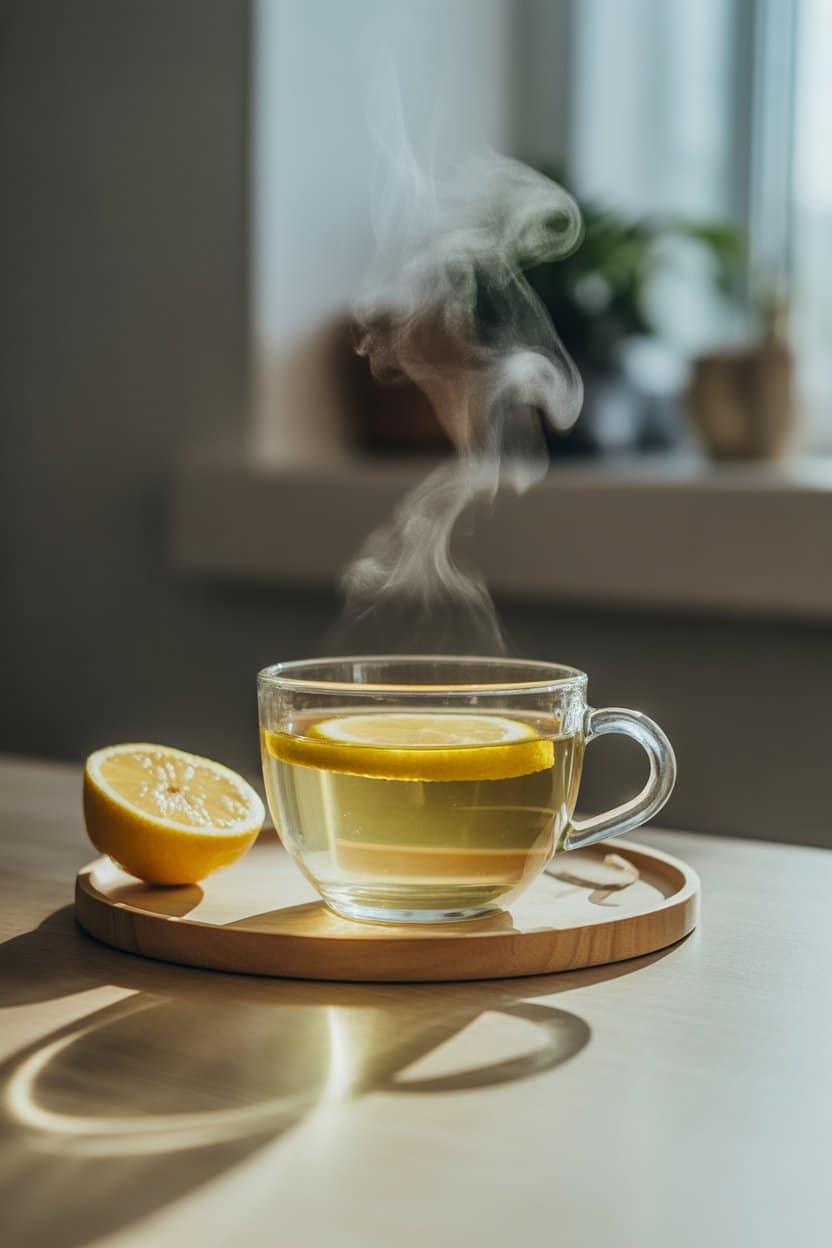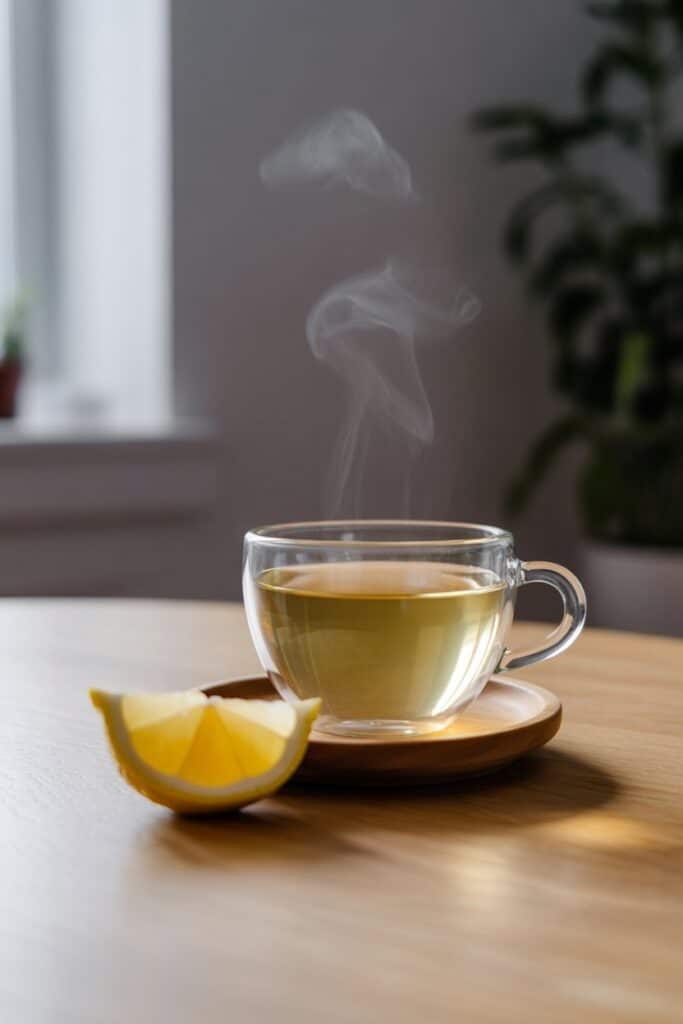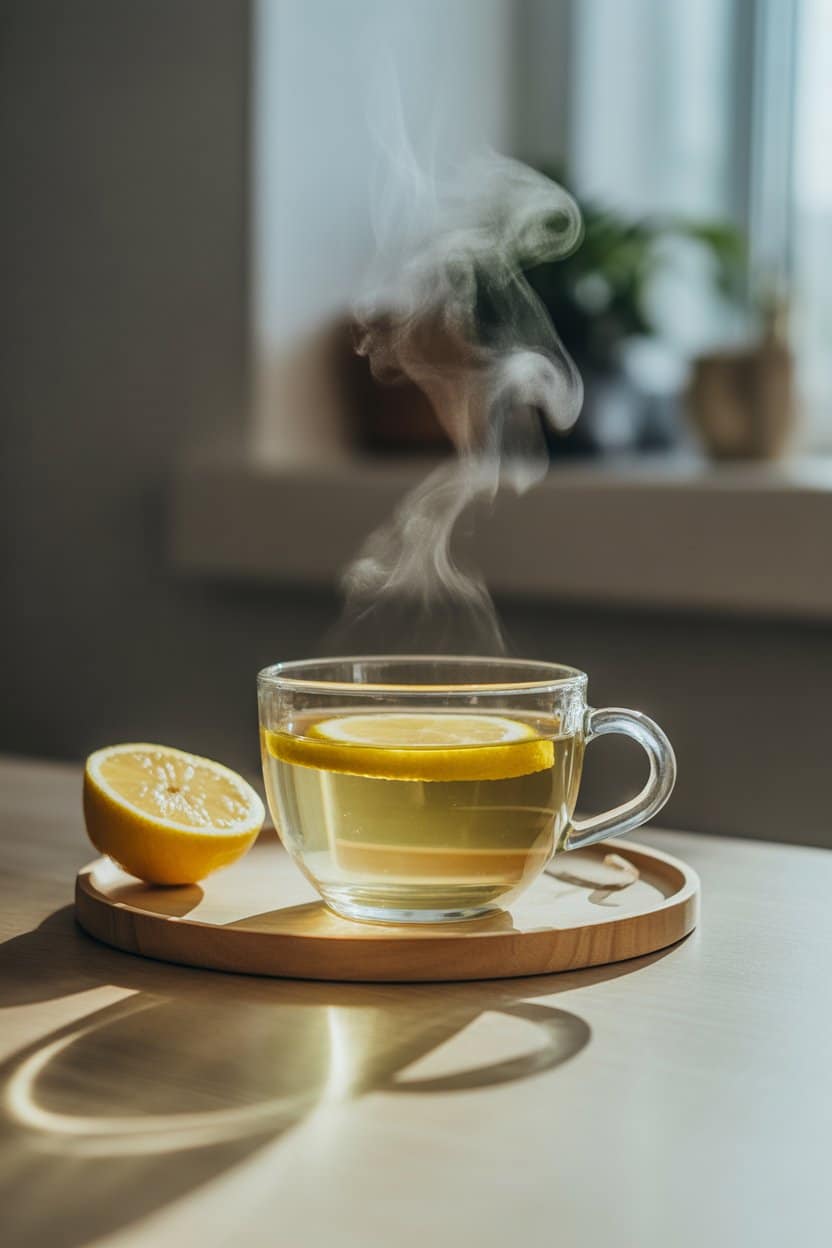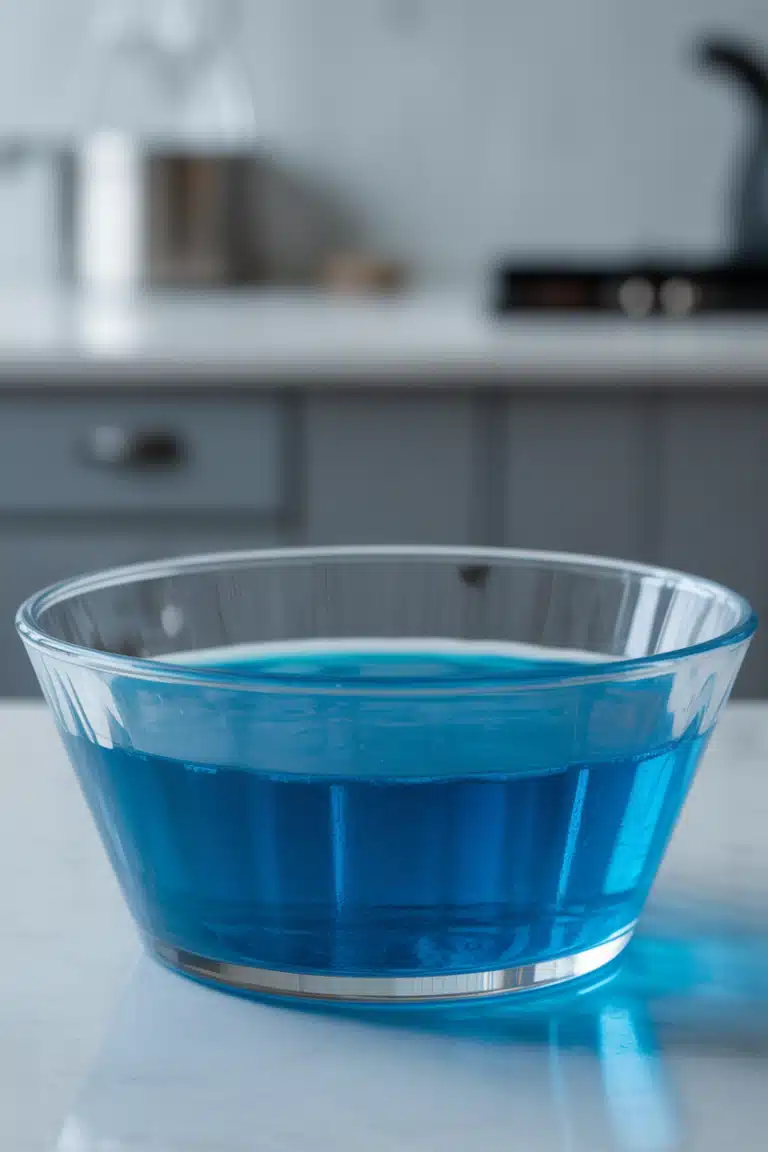Follow Me On Social Media!
Drinking Green Tea with Apple Cider Vinegar

Last updated on August 28, 2025
Drinking green tea with apple cider vinegar is more than just a trendy mix; it’s a wellness ritual that blends ancient tradition with modern science. The soothing antioxidants in green tea meet the digestive kick of apple cider vinegar, creating a drink many people swear by for energy, metabolism, and gut health. In this article, we’ll look at how to make it, what science says about the combo, and how to enjoy it safely. You’ll also learn the best times to drink it and the do’s and don’ts for maximum benefits.
Key Takeaways
- Drinking green tea with apple cider vinegar may support weight loss, digestion, and energy.
- Timing matters: morning offers metabolism support, while evening may help digestion.
- Always dilute apple cider vinegar to protect teeth and stomach lining.
- Combining with ginger or lemon can add flavor and extra health perks.
- Not everyone should drink it — check safety notes before starting.
Why Drinking Green Tea with Apple Cider Vinegar Became a Wellness Ritual
For me, drinking green tea with apple cider vinegar started as a simple curiosity, almost an experiment. I loved the calm focus green tea gave me, but I was also intrigued by the bold reputation of apple cider vinegar. It seemed like everyone I knew was sipping it in the mornings, promising everything from weight loss to glowing skin. When I combined the two, it wasn’t just about taste—it became about balance. Green tea’s gentle warmth smoothed out the sharpness of vinegar, making it not just drinkable, but surprisingly energizing.
Many people are drawn to this blend because it feels like a double boost: green tea supplies catechins, powerful antioxidants that support metabolism, while apple cider vinegar adds acetic acid, which may aid digestion and blood sugar control. Together, they create a drink that feels cleansing yet comforting, a small daily ritual that signals, “I’m taking care of myself today.”
The Science Behind the Pairing
Green tea has long been studied for its benefits on weight management, heart health, and mental focus. Apple cider vinegar, meanwhile, has been used in traditional remedies for centuries. Modern studies suggest it can help regulate blood sugar, improve digestion, and even increase satiety, which means you feel full for longer. When combined, these two drinks create a synergy—green tea’s thermogenic effect may slightly increase calorie burning, while apple cider vinegar’s acidity can help slow the absorption of carbs.
A Gentle Start to the Day
Drinking green tea with apple cider vinegar in the morning feels like a reset button. Unlike coffee, which can sometimes spike energy and then crash, this combination provides a more sustained lift. It’s hydrating, flavorful, and gives your metabolism a gentle nudge without overwhelming your system. Many people find it a satisfying alternative to sugary drinks or heavy breakfast choices, making it a natural fit for anyone trying to live lighter and healthier.
Drinking green tea with apple cider vinegar combines the antioxidants of tea with the digestive support of vinegar, creating a balanced, energizing morning drink that supports overall wellness.
The Health Benefits of Drinking Green Tea with Apple Cider Vinegar
When people ask why drinking green tea with apple cider vinegar has become such a talked-about practice, the answer is simple: the benefits feel noticeable. From metabolism to skin, this blend touches on several aspects of wellness. Let’s break them down.
Supports Weight Loss Naturally
One of the most common reasons people reach for this mix is weight management. Green tea is rich in catechins, especially EGCG, which has been shown to slightly boost fat burning and increase calorie expenditure. Apple cider vinegar, on the other hand, contains acetic acid, which may suppress appetite and slow down starch digestion. The result? A combination that can help reduce overall calorie intake.
If you’re specifically interested in slimming recipes, you’ll love exploring an apple cider vinegar weight loss recipe that expands on this drink with variations designed for daily use. It’s a simple way to make the most of this ancient health tonic while keeping taste and variety in mind.
Improves Digestion and Gut Health
Apple cider vinegar has long been praised for aiding digestion. Its natural acidity may help break down food more efficiently, which can reduce bloating after meals. Meanwhile, green tea supports gut health with its polyphenols, which act like prebiotics, feeding beneficial gut bacteria. Together, they create a drink that feels cleansing after a heavy meal and soothing when you want to feel light.
Boosts Energy Without Jitters
Unlike coffee, which sometimes leads to a mid-morning crash, green tea delivers a steady stream of energy thanks to L-theanine, an amino acid that promotes calm focus. When paired with apple cider vinegar, the drink feels even more refreshing. Some people report that the slight tang of vinegar wakes them up mentally, making it a good choice before a workout or a long day at the desk.
May Benefit Skin and Immunity
The antioxidants in green tea fight oxidative stress, which is linked to skin aging. Apple cider vinegar, with its antimicrobial properties, has been used traditionally to support skin clarity. Drinking them together won’t replace your skincare routine, but it may give your complexion an inner glow over time. The vitamin C in green tea also supports immune health, making this blend a small but consistent step toward resilience.
Drinking green tea with apple cider vinegar may support weight loss, digestion, energy, and skin health, making it a versatile and natural addition to a daily wellness routine.
How to Prepare Drinking Green Tea with Apple Cider Vinegar
Making this drink at home is simple, but the right balance matters. Too much vinegar can be harsh on your stomach and teeth, while too little green tea may reduce its calming effect. The goal is to find a ratio that feels good for your body while keeping flavor enjoyable.
The Basic Recipe
Here’s a tried-and-true method for preparing a balanced cup:
- 1 cup of brewed green tea (steeped for 2–3 minutes, not too bitter)
- 1–2 teaspoons of apple cider vinegar (raw, unfiltered, with the “mother”)
- ½ teaspoon of honey or stevia (optional, to cut sharpness)
Stir well and sip slowly. The warmth of the tea mellows out the acidity of vinegar, creating a drink that feels energizing without being overwhelming.
👉 For those focused on slimming recipes, you can also check this apple cider vinegar weight loss recipe, which expands on ways to combine vinegar with teas, smoothies, and detox blends for maximum variety.
Flavorful Variations
If plain green tea with vinegar feels a little strong, here are some refreshing twists:
- With Lemon and Ginger
Adding a slice of lemon or a pinch of grated ginger not only brightens the flavor but also increases antioxidant and anti-inflammatory benefits. Ginger is especially popular in drinking green tea with apple cider vinegar ginger gummies, a fun modern twist. - With Baking Soda
Some people experiment with drinking green tea with apple cider vinegar and baking soda to reduce acidity. While this may soften the vinegar’s bite, always consult a reliable health source before making it a habit. According to the U.S. National Library of Medicine (NIH), apple cider vinegar should remain diluted for safety. - With Honey or Cinnamon
A teaspoon of honey or a dash of cinnamon can make the drink taste more like a wellness tea. Cinnamon may also support blood sugar balance, as supported by USDA research.
Safety Tips When Preparing
- Always dilute vinegar; never drink it straight.
- Use a straw to minimize contact with teeth enamel.
- Drink it before meals for digestion or in the morning to kick-start metabolism.
- Avoid boiling vinegar in the tea, as high heat can reduce its beneficial enzymes.
Why Wikipedia Matters Here
Both green tea and apple cider vinegar have long histories rooted in traditional medicine, which adds cultural depth to their modern pairing. Linking back to this history can help readers understand why this drink feels both ancient and trendy at the same time.
To prepare drinking green tea with apple cider vinegar, combine brewed tea with 1–2 teaspoons of raw vinegar, adjust flavor with lemon, ginger, or honey, and always dilute for safe and effective results.
When and How to Drink Green Tea with Apple Cider Vinegar Safely
One of the most common questions I get is whether it’s better to drink green tea with apple cider vinegar in the morning or at night. The truth is, timing can change the effect, and your own body’s needs should guide you.
Morning Drink for Energy and Metabolism
Many people enjoy this drink first thing in the morning. The green tea provides a calm but steady lift, while apple cider vinegar supports digestion and may help regulate blood sugar. Together, they create a morning ritual that feels like a natural reset.
If your main goal is weight management, pairing this habit with an apple cider vinegar weight loss recipe can make it even more effective. For example, alternating between green tea blends and light vinegar smoothies keeps the routine interesting without sacrificing benefits.
Evening Drink for Digestion
Others prefer drinking it after their last meal. The vinegar may help reduce bloating and promote smoother digestion, while the green tea provides antioxidants that support your body overnight. If caffeine sensitivity is an issue, switch to decaf green tea in the evening to avoid disrupted sleep.
Safety Considerations You Can’t Ignore
- Always dilute vinegar: Undiluted vinegar can harm tooth enamel and irritate your throat.
- Avoid empty stomach if sensitive: Some people experience nausea if they drink vinegar before eating. If this happens, take it with a light snack.
- Mind your medications: Apple cider vinegar can interact with certain medicines, especially those for blood sugar or potassium levels. If unsure, consult a healthcare provider.
- Limit to 1–2 teaspoons per serving: More is not always better; excessive vinegar can upset digestion.
Real Testimonial: Sophie’s Story
When my partner Sophie first started drinking green tea with apple cider vinegar, she was skeptical. The flavor was strong, and she wasn’t sure if she could stick with it. But within three weeks, she noticed two things: her afternoon sugar cravings faded, and she felt lighter after meals. Her story isn’t unique—many people echo similar results when making this drink part of their daily routine.
That’s why it’s important to view this combination as more than just a quick fix. Like any wellness habit, the benefits come with consistency, not overnight miracles.
Drink green tea with apple cider vinegar in the morning for metabolism and energy, or at night for digestion. Always dilute vinegar, start small, and pair with a balanced routine for the best results.

Myths, Mistakes, and What You Shouldn’t Mix with Apple Cider Vinegar
Whenever apple cider vinegar trends, so do the myths. People start mixing it with everything, hoping for quick fixes. But when it comes to drinking green tea with apple cider vinegar, knowing what not to do is just as important as knowing how to prepare it.
Common Myths About Apple Cider Vinegar
One myth is that more vinegar equals faster results. In reality, drinking large amounts can damage your teeth, upset your stomach, and even affect potassium levels. Another myth is that vinegar works instantly for weight loss. The truth is, while it may help control appetite and support metabolism, results come gradually and should always be paired with healthy eating and movement.
For realistic guidance, I always recommend pairing this drink with an apple cider vinegar weight loss recipe. Recipes like these keep vinegar balanced with other nourishing ingredients such as lemon, cucumber, or herbal teas—making the routine safe, effective, and sustainable.
What You Should Never Mix with Apple Cider Vinegar
Apple cider vinegar is acidic, so combining it with certain things can cause issues:
- Undiluted consumption: Never drink it straight. It can burn your throat and weaken tooth enamel.
- Alkaline powders like baking soda (unless very diluted and carefully balanced): Some recipes online suggest adding baking soda, but overuse can disrupt your stomach’s natural acid balance.
- High-caffeine drinks: Mixing vinegar into strong coffee or energy drinks can irritate digestion.
- Certain medications: According to MedlinePlus, vinegar may interact with diuretics, insulin, and heart medications. Always check with a healthcare provider first.
Mistakes to Avoid
- Drinking on an empty stomach if you’re sensitive. Some people thrive on it, but others feel nauseous. Test what works for you.
- Skipping dilution: At minimum, mix 1 teaspoon vinegar into 1 cup of tea or water.
- Expecting miracles: Vinegar won’t replace balanced meals or movement. Think of it as a supportive ally, not a magic pill.
Why This Matters for Weight Loss
Many of these mistakes happen because people are chasing quick results. But sustainable weight loss is about creating enjoyable routines. That’s why having a go-to apple cider vinegar weight loss recipe helps—it shows you how to incorporate vinegar into teas, detox waters, and smoothies without overdoing it.
: Don’t drink apple cider vinegar straight, mix it with strong stimulants, or expect instant results. Pairing it with safe recipes like green tea blends is the smart, sustainable way forward.

What Science Says About Drinking Green Tea with Apple Cider Vinegar
A lot of people try drinking green tea with apple cider vinegar because of the buzz online. But what does science actually say? The truth is a mix of promising evidence and cautious interpretation. Let’s break it down.
The Science on Green Tea
Green tea has one of the most well-researched profiles in the beverage world. Its catechins, especially EGCG, have been shown to:
- Boost metabolism slightly by increasing fat oxidation.
- Support heart health by lowering LDL cholesterol.
- Provide antioxidants that may slow down cellular aging.
A 2013 study in the American Journal of Clinical Nutrition reported that green tea catechins may help with weight loss when paired with balanced diets and exercise.
The Science on Apple Cider Vinegar
Apple cider vinegar contains acetic acid, which has been linked to:
- Improved insulin sensitivity (helping with blood sugar control).
- Appetite reduction by promoting a feeling of fullness.
- Enhanced digestion through its natural acidity.
The National Institutes of Health (NIH) notes that vinegar can help slow down how quickly sugar enters the bloodstream, which may reduce post-meal spikes. However, these benefits require consistency and moderation—chugging straight vinegar won’t deliver better results.
Fact vs. Fiction
- Fiction: Drinking green tea with apple cider vinegar melts fat instantly.
- Fact: It can support calorie control and metabolism when paired with diet and movement.
- Fiction: Apple cider vinegar can replace medicine.
- Fact: It may complement healthy habits but should not substitute prescribed treatment.
If weight loss is your focus, start by experimenting with a simple apple cider vinegar weight loss recipe. These recipes use smart combinations—like cucumber or lemon water—that research supports as low-calorie, hydrating, and beneficial.
Why Blending the Two Works Better
By combining tea and vinegar, you get two different mechanisms:
- Tea increases thermogenesis (heat production that burns calories).
- Vinegar slows digestion and moderates appetite.
Science shows that drinking green tea with apple cider vinegar may support weight control, digestion, and blood sugar balance—but it’s no magic pill. Combine it with nourishing recipes and lifestyle habits for lasting results.

Green Tea with Apple Cider Vinegar
Ingredients
Equipment
Method
- Boil water and allow it to cool slightly before steeping green tea.
- Steep green tea bag (or loose leaves) for 2–3 minutes, then remove.
- Stir in 1–2 teaspoons of apple cider vinegar.
- Add honey, lemon, or ginger if desired for extra flavor.
- Stir well, sip slowly, and enjoy warm.
Nutrition
Notes
Tried this recipe?
Let us know how it was!FAQs on Drinking Green Tea with Apple Cider Vinegar
What should you not mix with apple cider vinegar?
You should never drink apple cider vinegar undiluted—it can harm your teeth and throat. Avoid mixing it with high-caffeine drinks, strong alcohol, or excessive baking soda. Certain medications, like insulin or diuretics, may interact with vinegar, so check with a healthcare provider before combining.
What happens if you drink apple cider vinegar every morning for a month?
Most people report feeling lighter digestion, more stable blood sugar, and reduced cravings. Some notice weight changes when pairing it with balanced eating. However, overdoing it can irritate your stomach and weaken tooth enamel, so keep the dose small and always diluted in tea or water.
Does apple cider vinegar in tea help you lose weight?
Yes, it can help—but it’s not a magic bullet. Apple cider vinegar may increase satiety, while green tea provides antioxidants that support fat burning. Together, they can complement healthy eating and movement. For practical examples, try a structured apple cider vinegar weight loss recipe.
Is it safe to drink apple cider vinegar on an empty stomach?
It depends. Some people tolerate it well, especially when diluted in green tea. Others may feel nausea or stomach discomfort. If you’re sensitive, drink it after a light meal or snack instead of on an empty stomach.
What is the best thing to mix with apple cider vinegar?
Green tea is an excellent option, but other good choices include lemon water, ginger tea, or cucumber-infused water. These combinations improve taste, add antioxidants, and support digestion without overwhelming acidity.
Is it better to drink apple cider vinegar in the morning or at night?
Morning is great if you want a metabolism boost and appetite control throughout the day. Night works better if digestion is your focus. If caffeine bothers your sleep, swap regular green tea for decaf in evening recipes.








